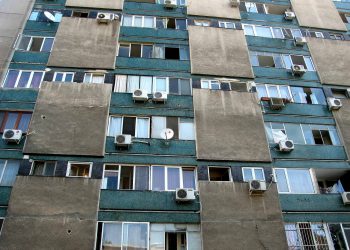Renovation Wave in the EU with a refurbished and improved building stock will help pave the way for a decarbonised and clean energy system. Building sector is one of the largest energy consumers in Europe and is responsible for more than one third of the EU’s emissions. But only 1% of buildings undergo energy efficient renovation every year, so effective action is crucial to making Europe climate-neutral by 2050. Currently, roughly 75% of the building stock is energy inefficient, yet almost 85-95% of today’s buildings will still be in use in 2050.
Renovation of both public and private buildings is an essential measure in this context, and has been singled out in the European Green Deal as a key initiative to drive energy efficiency in the sector and deliver on objectives.
Given the labour-intensive nature of the building sector, which is largely dominated by local businesses, renovations of buildings also plays a crucial role in the European recovery of the COVID-19 pandemic. To kick-start the recovery, the Commission has identified doubling the renovation rate in its dedicated recovery plan.
A renovation wave for Europe
To pursue this ambition of energy gains and economic growth, the Commission published on 14 October 2020 a new strategy to boost renovation called “A Renovation Wave for Europe – Greening our buildings, creating jobs, improving lives” (COM(2020)662). It aims to double annual energy renovation rates in the next ten years. These renovations will enhance the quality of life for people living in and using the buildings, reduce Europe’s greenhouse gas emissions, and create up to 160,000 additional green jobs in the construction sector.
With nearly 34 million Europeans unable to afford keeping their home adequately heated, renovation is also an important response to energy poverty. It can address the health and wellbeing of vulnerable people while reducing their energy bills, as outlined in the Commission Recommendation on Energy Poverty ((EU) 2020/1563), which was published as part of the Renovation wave strategy.
In parallel to the strategy, the Commission adopted new rules for the smart readiness of buildings (C(2020)6929-6930). Specifically, the smart readiness indicator aims to promote digitally friendly renovations, integrate renewable energy and enable measurements of actual energy consumption.
Renovation Wave: Cities and regions ready to deliver

The European Committee of the Regions urges the European Commission and Member States to establish easier and faster financing mechanisms for local and regional authorities to undertake renovation projects
The European Committee of the Regions (CoR) has unanimously adopted an opinion on the Renovation Wave , the EU’s plan to upgrade the energy performance of Europe’s building stock. Accounting for 40% of Europe’s energy consumption and 36% of greenhouse gas emissions (GHG), the renovation of buildings is key for the EU to reach climate neutrality by 2050. Cities and regions call for a revision of state aid schemes, more flexible budget rules to maximise investments and renovations, subnational targets for the renovation of buildings and the integration of renewable energy sources in renovation projects.
EU commissioner for energy Kadri Simson
Following a plenary debate with EU commissioner for energy Kadri Simson, Enrico Rossi (IT/PES) , CoR rapporteur on the opinion on the Renovation Wave , Member of Signa Municipal Council (Florence) and former president of the Tuscany Region (2010-2020), said: “The green recovery begins in our homes. With the Renovation Wave as a fundamental pillar of the Green Deal, we can relaunch our economy, create 160 000 jobs in the building sector, and fight energy poverty, while at the same time meeting our climate neutrality goals. We need to make sure that the resources of the new Multiannual Financial Framework, the Recovery Plan, and the national and regional funds are used in synergy and not diverted to elsewhere. For its success, cities and regions must play a key role. This is why we need concrete tools, such as a local technical assistance facility, accessible to all local and regional authorities for the implementation of the Renovation Wave, along with trainings for workers, in particular in SMEs, to help create more jobs.”
The CoR calls on the European Commission and Member States to establish direct financing mechanisms for local and regional authorities to undertake renovation projects. It also urges for the delivery of the announced revision of European state aid schemes for energy efficiency in buildings in order to overcome current investment barriers.
Flexible budget rules for local authorities
Cities and regions urge the European Commission to work with Member States to establish more flexible budget rules for local and regional administrations so as to enhance their capacity to invest in the renovation of existing buildings and new social housing. It also points out that, in order to implement the Renovation Wave, the Commission and the Member States must provide significant support to the construction sector to overcome gaps in knowledge regarding skills, technology and the retraining of workers.
The Renovation Wave must be supported by a solid technical assistance available to all local and regional authorities. Members advocate for strengthening and decentralising the EIB’s ELENA facility by streamlining the model of One-Stop-Shop to deliver technical assistance to all local and regional authorities and businesses.
The CoR opinion urges the European Commission and Member States to fully incorporate the Renovation Wave into the recovery and resilience programmes (RRF) as well as the European Structural and Investment Funds (ESIF).
Additional CoR proposals to successfully roll-out the Renovation Wave in every territory include:
- Measures to avoid “renovictions” (evictions by renovation). The European Commission and all levels of governments must avoid that renovation costs are passed on to the tenants and proposes rent increases to be balanced by energy-savings.
- The CoR calls on the European Commission to require that the Member States give local and regional authorities a full and effective role in preparing and acting on their national recovery and resilience plans by developing effective multilevel climate and energy dialogues.
- The renovation wave must be equally deployed to less urbanised, more outlying areas, including rural communities.
- To foster circular processes in the building sector and strengthen certification mechanisms that encourage the selection of construction materials and techniques based on their lifecycle.
- Strengthen local energy communities and the “prosumer” through decentralised energy production and incentives to develop the “warm rent” model – the basic principle applied in Sweden and Finland – whereby property owners are encouraged to save energy while guaranteeing a suitable indoor environment.
- Extend the analysis of energy poverty beyond individual households and use the model of “environmentally-friendly manufacturing areas” as a useful reference for involving the manufacturing industry in the Renovation Wave.
Europe climate-neutral by 2050
- Provide significant support to the construction sector, which has been severely affected by the crisis and often involves small businesses.
- More ambitious efforts to decarbonise residential heating and cooling, which is responsible for more than 80% of the overall energy consumption of buildings in the EU.
- Members welcome the Climate Pact and commit to support its roll-out, in particular by involving citizens. The CoR recognises the fundamental role of the Climate Pact to guarantee that the Renovation Wave is deployed effectively, and that capacity and tools are available to local and regional authorities.
- Members call on the European Commission to continue promoting the deployment of energy management systems and Building Information Modeling (BIM).
- Develop a systematic application of Green Public Procurement criteria for the buildings’ sector to bring about a rapid reduction in energy consumption and ensure the broad take-up of more sustainable management models.
- Data on buildings’ energy consumption should be readily available free of charge across the entire EU.
- Set subnational targets for the integration of renewable energy sources in buildings.
- The CoR endorses the proposal for a Smart Readiness Indicator (SRI) to assess the degree to which buildings are ready for the integration of smart technologies and to inform building owners and occupants of the findings.
- To update the energy performance certificate (EPC) framework so as to increase the proportion of the building stock covered by energy performance certificates.
- The legislative requirements for purchasing and renovating all existing public buildings, minimum energy performance standards and mandatory targets for annual renovation rates need to be flexible to account for the different building characteristics and circumstances in every territory.
EU building projects
The Commission supports many projects on building renovation, as well as research and innovation in the area, through the Horizon programmes. For example
- the BUILD UP initiative, which provides a web portal that focus on collective intelligence on energy reduction in buildings for all relevant audiences
- the BUILD UP Skills initiative working to increase the number of qualified building professionals across Europe to deliver building renovations, which offer high-energy performance, as well as new, nearly zero-energy buildings
- the 4RinEU project, which aims to provide new tools and strategies to encourage large scale renovation of existing buildings and fostering the use of renewable energies (see article about the project “Home improvements for the planet” in six languages).















